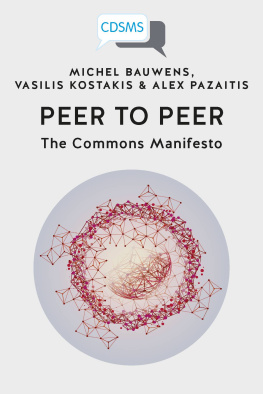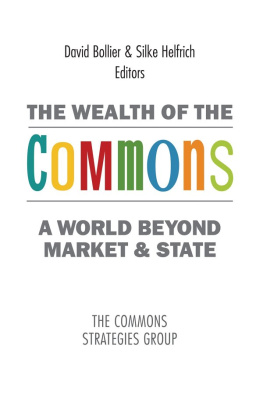Cover

| title | : | John R. Commons Volume Two / : Selected Essays |
| author | : | Commons, John Rogers.; Rutherford, Malcolm,; Samuels, Warren J., |
| publisher | : | Taylor & Francis Routledge |
| isbn10 | asin | : |
| print isbn13 | : | 9780203011515 |
| ebook isbn13 | : | 9780585461335 |
| language | : | English |
| subject | Economics, Institutional economics, Sociology, United States--Economic policy, United States--Social policy. |
| publication date | : | 1996 |
| lcc | : | HB119.C58A25 1996eb |
| ddc | : | 330 |
| subject | : | Economics, Institutional economics, Sociology, United States--Economic policy, United States--Social policy. |
Page i
JOHN R.COMMONS: SELECTED ESSAYS
John R.Commons is one of the most significant figures in the development of American economics. One of the founders of the institutional school, Commons developed theories of the evolution of capitalism and of institutional change which continue to influence modern economics. These volumes collect, for the first time, his major essays and articles.
Malcolm Rutherford is a Professor of Economics at the University of Victoria, British Columbia, Canada. His research has focused on the major contributors to the American institutionalist tradition in economics, including Veblen, Commons, Mitchell and Ayres, and on the comparison of the old and new institutional economics. He is the author of Institutions in Economics: The Old and the New Institutionalism.
Warren J.Samuels is Professor of Economics at Michigan State University, East Lansing. He specializes in the history of economic thought, methodology, and law and economics. He is past president of the History of Economics Society and the Association for Social Economics, and the recipient of the Veblen-Commons Award of the Association for Evolutionary Economics. He is the author of The Classical Theory of Economic Policy and Pareto on Policy.
Page ii
This page intentionally left blank.
Page iii
JOHN R.COMMONS: SELECTED ESSAYS
Edited by
Malcolm Rutherford and Warren J.Samuels
VOLUME TWO

London and New York
Page iv
First published 1996
by Routledge
11 New Fetter Lane, London EC4P 4EE
Simultaneously published in the USA and Canada
by Routledge
29 West 35th Street, New York, NY 10001
Routledge is an International Thomson Publishing company
This edition published in the Taylor & Francis e-Library, 2002.
1996 Malcolm Rutherford and Warren J.Samuels
All rights reserved. No part of this book may be reprinted or
reproduced or utilized in any form or by any electronic,
mechanical, or other means, now known or hereafter
invented, including photocopying and recording, or in any
information storage or retrieval system, without permission in
writing from the publishers.
British Library Cataloguing in Publication Data
A catalogue record for this book is available from the British Library
Library of Congress Cataloging in Publication Data
A catalogue record for this book has been requested
ISBN 0-203-01151-1 Master e-book ISBN
ISBN 0-203-28486-0 (OEB Format)
ISBN 0-415-13733-0 (Print Edition) [set]
ISBN 0-415-14438-8 (Print Edition) vol. I
ISBN 0-415-14439-6 (Print Edition) vol. II
Page v
CONTENTS
24
HOBSONS ECONOMICS OF UNEMPLOYMENT (1923) | |
25
THE DELIVERED PRICE PRACTICE IN THE STEEL MARKET (1924) | |
26
LAW AND ECONOMICS (1925) | |
27
THE PASSING OF SAMUEL GOMPERS (1925) | |
28
THE STABILIZATION OF PRICES AND BUSINESS (1925) | |
29
THE TRUE SCOPE OF UNEMPLOYMENT INSURANCE (1925) | |
30
MARX TODAY: CAPITALISM AND SOCIALISM (1925) | |
31
PRICE STABILIZATION AND THE FEDERAL RESERVE SYSTEM (1927) | |
32
RESERVE BANK CONTROL OF THE GENERAL PRICE LEVEL: A REJOINDER (1927) | |
33
LEGAL AND ECONOMIC JOB ANALYSIS (with E.W.Morehouse) (1927) | |
34
INSTITUTIONAL ECONOMICS (1931) | |
35
THE PROBLEM OF CORRELATING LAW, ECONOMICS AND ETHICS (1932) | |
36
THE PLACE OF ECONOMICS IN SOCIAL PHILOSOPHY (1935) | |
37
INSTITUTIONAL ECONOMICS (1936) | |
38
CAPACITY TO PRODUCE, CAPACITY TO CONSUME,CAPACITY TO PAY DEBTS (1937) | |
39
TWENTIETH CENTURY ECONOMICS (1939) | |
40
LEGISLATIVE AND ADMINISTRATIVE REASONING IN ECONOMICS (1942) | |
Index | |
Page vi
This page intentionally left blank.
Page 307
24
HOBSONS ECONOMICS OF UNEMPLOYMENT1
American Economic Review 13 (December 1923):638647.
Economic theories may be placed in four groups according to the remedies proposed for unemployment and business depression, as follows: (1) reduction of wages, (2) reduction of profits, rent and interest, (3) free banking, and (4) bank regulation. Each of these proposed remedies goes back to one of four factors in the modern economic process which the particular group sets forth as its most important factor, though all of them are essential to the process. These factors are, in the order of the remedies mentioned: (1) the production and consumption of goods, (2) inequality of private ownership of the goods, (3) exchange and alienation of titles to the goods, and (4) the promises of banks and business men to deliver goods or pay an equivalent value in the future. Starting out with one of these factors as the most important, each group develops the implications of that factor and thus arrives at one of the four types of remedies.
The production and consumption group, with its remedy of wage reduction, begins with Ricardo, followed by the assemblage of those who find their explanations of business depressions in the natural or unavoidable operations of demand and supply under the influence of costs of production, and may be known as the classical, neo-classical, laissez-faire, or business economists.
The inequality-of-ownership group of theorists, with their remedy of reduction or elimination of the rents, profits, and interest that arise from inequalities of private property, have, as their outstanding economist, Karl Marx, followed by the entire socialistic school, the leading modern representative of which, from the standpoint of economic theory, is J.A.Hobson.
The exchange and alienation theories, with their remedy of free banking or paper money, based on a concept of money as a kind of transferable title to property like a warehouse certificate, start with Proudhon and the anarchists and find their recent representatives in Major Douglas,2 Henry Ford and Thomas Edison, who adhere to private property with its inequalities,
Next page














